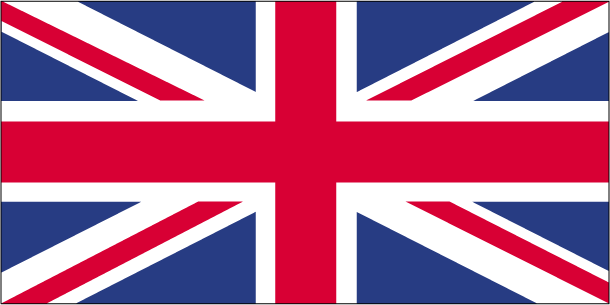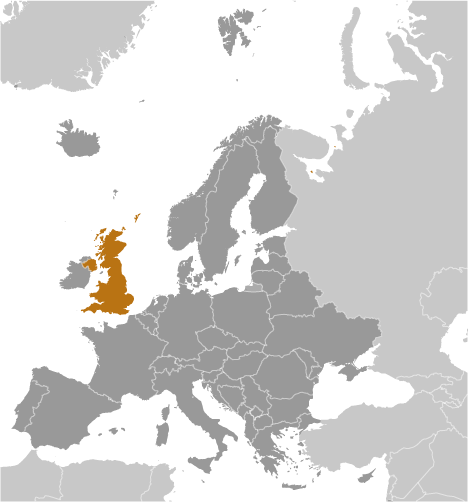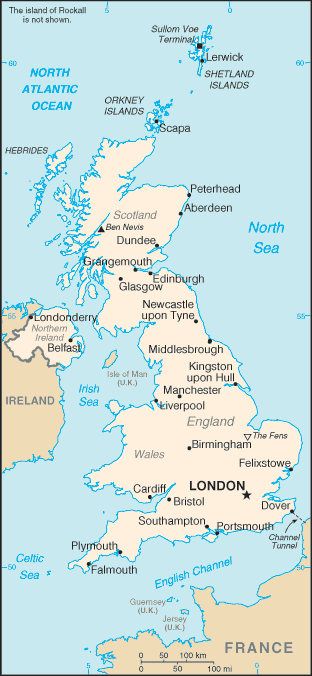
|
|
Advertisements:
EconomyEconomy - overview
The UK, a leading trading power and financial center, is the third largest economy in Europe after Germany and France. Over the past two decades, the government has greatly reduced public ownership and contained the growth of social welfare programs. Agriculture is intensive, highly mechanized, and efficient by European standards, producing about 60% of food needs with less than 2% of the labor force. The UK has large coal, natural gas, and oil resources, but its oil and natural gas reserves are declining and the UK became a net importer of energy in 2005. Services, particularly banking, insurance, and business services, account by far for the largest proportion of GDP while industry continues to decline in importance. After emerging from recession in 1992, Britain's economy enjoyed the longest period of expansion on record during which time growth outpaced most of Western Europe. In 2008, however, the global financial crisis hit the economy particularly hard, due to the importance of its financial sector. Sharply declining home prices, high consumer debt, and the global economic slowdown compounded Britain's economic problems, pushing the economy into recession in the latter half of 2008 and prompting the then BROWN (Labour) government to implement a number of measures to stimulate the economy and stabilize the financial markets; these include nationalizing parts of the banking system, temporarily cutting taxes, suspending public sector borrowing rules, and moving forward public spending on capital projects. Facing burgeoning public deficits and debt levels, in 2010 the CAMERON-led coalition government (between Conservatives and Liberal Democrats) initiated a five-year austerity program, which aims to lower London's budget deficit from over 10% of GDP in 2010 to nearly 1% by 2015. In November 2011, Chancellor of the Exchequer George OSBORNE announced additional austerity measures through 2017 because of slower-than-expected economic growth and the impact of the euro-zone debt crisis. The CAMERON government raised the value added tax from 17.5% to 20% in 2011. It has pledged to reduce the corporation tax rate to 23% by 2015. The Bank of England (BoE) implemented an asset purchase program of up to £325 billion (approximately $525 billion) as of February 2011. During times of economic crisis, the BoE coordinates interest rate moves with the European Central Bank, but Britain remains outside the European Economic and Monetary Union (EMU). Gdp (purchasing power parity) World Ranking: 9
$2.29 trillion (2011 est.)
$2.275 trillion (2010 est.) $2.228 trillion (2009 est.) Note Data are in 2011 US dollars Gdp (official exchange rate)
$2.418 trillion (2011 est.)
Gdp - real growth rate World Ranking: 182
0.7% (2011 est.)
2.1% (2010 est.) -4.4% (2009 est.) Gdp - per capita (ppp) World Ranking: 33
$36,600 (2011 est.)
$36,600 (2010 est.) $36,100 (2009 est.) Note Data are in 2011 US dollars Gdp - composition by sector
Agriculture 0.7%
Industry 21.4% Services 77.8% (2011 est.) Labor force World Ranking: 20
31.73 million (2011 est.)
Labor force - by occupation
Agriculture 1.4%
Industry 18.2% Services 80.4% (2006 est.) Unemployment rate World Ranking: 97
8.1% (2011 est.)
7.8% (2010 est.) Population below poverty line
14% (2006 est.)
Household income or consumption by percentage share
Lowest 10% 2.1%
Highest 10% 28.5% (1999) Distribution of family income - gini index World Ranking: 91
34 (2005)
36.8 (1999) Investment (gross fixed) World Ranking: 137
14.3% of GDP (2011 est.)
Budget
Revenues $986.5 billion
Expenditures $1.188 trillion (2011 est.) Taxes and other revenues World Ranking: 46
40.8% of GDP (2011 est.)
Budget surplus (+) or deficit (-) World Ranking: 187
-8.3% of GDP (2011 est.)
Public debt World Ranking: 17
86.3% of GDP (2011 est.)
79.6% of GDP (2010 est.) Note Data cover general government debt, and include debt instruments issued (or owned) by government entities other than the treasury; the data include treasury debt held by foreign entities; the data include debt issued by subnational entities, as well as intra-governmental debt; intra-governmental debt consists of treasury borrowings from surpluses in the social funds, such as for retirement, medical care, and unemployment; debt instruments for the social funds are not sold at public auctions. Inflation rate (consumer prices) World Ranking: 112
4.5% (2011 est.)
3.3% (2010 est.) Central bank discount rate World Ranking: 140
0.5% (31 December 2011 est.)
0.5% (31 December 2010 est.) Commercial bank prime lending rate World Ranking: 168
4% (31 December 2011 est.)
3.962% (31 December 2010 est.) Stock of narrow money World Ranking: 37
$92.77 billion (31 December 2011 est.) $88.88 billion (31 December 2010 est.) Stock of broad money World Ranking: 6
$3.884 trillion (31 December 2011 est.) $3.362 trillion (31 December 2010 est.) Stock of domestic credit World Ranking: 5
$5.151 trillion (31 December 2009) $4.436 trillion (31 December 2008) Market value of publicly traded shares World Ranking: 5
$1.202 trillion (31 December 2011) $3.107 trillion (31 December 2010) $2.796 trillion (31 December 2009) Agriculture - products
Cereals, oilseed, potatoes, vegetables; cattle, sheep, poultry; fish Industries
Machine tools, electric power equipment, automation equipment, railroad equipment, shipbuilding, aircraft, motor vehicles and parts, electronics and communications equipment, metals, chemicals, coal, petroleum, paper and paper products, food processing, textiles, clothing, other consumer goods Industrial production growth rate World Ranking: 152
-1.2% (2011 est.)
Electricity - production World Ranking: 11
346 billion kWh (2009 est.)
Electricity - consumption World Ranking: 12
344.7 billion kWh (2008 est.)
Electricity - exports
3.748 billion kWh (2009 est.)
Electricity - imports
2.861 billion kWh (2009 est.)
Oil - production World Ranking: 21
1.393 million bbl/day (2010 est.) Oil - consumption World Ranking: 15
1.622 million bbl/day (2010 est.) Oil - exports World Ranking: 20
1.311 million bbl/day (2009 est.) Oil - imports World Ranking: 13
1.45 million bbl/day (2009 est.) Oil - proved reserves World Ranking: 31
2.858 billion bbl (1 January 2011 est.) Natural gas - production World Ranking: 17
56.3 billion cu m (2010 est.)
Natural gas - consumption World Ranking: 8
94.28 billion cu m (2010 est.)
Natural gas - exports World Ranking: 17
15.65 billion cu m (2010 est.)
Natural gas - imports World Ranking: 6
53.63 billion cu m (2010 est.)
Natural gas - proved reserves World Ranking: 42
256 billion cu m (1 January 2011 est.) Current account balance World Ranking: 185
-$46.47 billion (2011 est.)
-$75.23 billion (2010 est.) Exports World Ranking: 11
$479.7 billion (2011 est.)
$410.9 billion (2010 est.) Exports - commodities
Manufactured goods, fuels, chemicals; food, beverages, tobacco Exports - partners
Germany 11.6%, US 10.6%, Netherlands 8.4%, France 7.8%, Ireland 6.4%, Belgium 5.7% (2011) Imports World Ranking: 7
$639.5 billion (2011 est.)
$563.3 billion (2010 est.) Imports - commodities
Manufactured goods, machinery, fuels; foodstuffs Imports - partners
Germany 13.2%, China 8.7%, Netherlands 7.5%, US 6.1%, France 6%, Norway 5%, Belgium 5% (2011) Reserves of foreign exchange and gold World Ranking: 25
$94.54 billion (31 December 2011 est.) $82.41 billion (31 December 2010 est.) Debt - external World Ranking: 3
$9.836 trillion (30 June 2011)
$8.981 trillion (30 June 2010) Stock of direct foreign investment - at home World Ranking: 4
$1.13 trillion (31 December 2011 est.) $1.076 trillion (31 December 2010 est.) Stock of direct foreign investment - abroad World Ranking: 3
$1.773 trillion (31 December 2011 est.) $1.675 trillion (31 December 2010 est.) Exchange rates
British pounds (GBP) per US dollar - 0.6241 (2011 est.)0.6472 (2010 est.) 0.6175 (2009) 0.5302 (2008) 0.4993 (2007) Fiscal year
6 April - 5 April
Comments
Add a new comment: |
Advertisement
Members area
United Kingdom (London):
 
GPS points from United Kingdom (London)
|
||||||||

 The United Kingdom has historically played a leading role in developing parliamentary democracy and in advancing literature and science. At its zenith in the 19th century, the British Empire stretched over one-fourth of the earth's surface. The first half of the 20th century saw the UK's strength seriously depleted in two world wars and the Irish Republic's withdrawal from the union. The second half witnessed the dismantling of the Empire and the UK rebuilding itself into a modern and prosperous European nation. As one of five permanent members of the UN Security Council and a founding member of NATO and the Commonwealth, the UK pursues a global approach to foreign policy. The UK is also an active member of the EU, although it chose to remain outside the Economic and Monetary Union. The Scottish Parliament, the National Assembly for Wales, and the Northern Ireland Assembly were established in 1999. The latter was suspended until May 2007 due to wrangling over the peace process, but devolution was fully completed in March 2010.
The United Kingdom has historically played a leading role in developing parliamentary democracy and in advancing literature and science. At its zenith in the 19th century, the British Empire stretched over one-fourth of the earth's surface. The first half of the 20th century saw the UK's strength seriously depleted in two world wars and the Irish Republic's withdrawal from the union. The second half witnessed the dismantling of the Empire and the UK rebuilding itself into a modern and prosperous European nation. As one of five permanent members of the UN Security Council and a founding member of NATO and the Commonwealth, the UK pursues a global approach to foreign policy. The UK is also an active member of the EU, although it chose to remain outside the Economic and Monetary Union. The Scottish Parliament, the National Assembly for Wales, and the Northern Ireland Assembly were established in 1999. The latter was suspended until May 2007 due to wrangling over the peace process, but devolution was fully completed in March 2010.